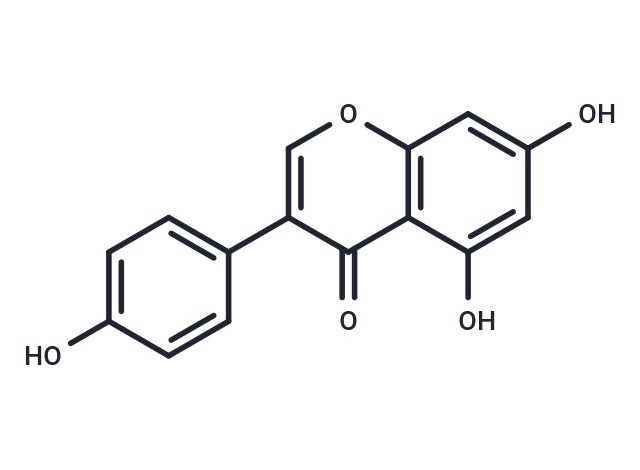Shopping Cart
Remove All Your shopping cart is currently empty
Your shopping cart is currently empty
Genistein (NPI 031L) is a naturally occurring soy isoflavone, a multi-targeted tyrosine kinase inhibitor. Genistein has antitumor, antioxidant, and anthelmintic properties, and also produces estrogen-like effects in the body.

| Pack Size | Price | USA Warehouse | Global Warehouse | Quantity |
|---|---|---|---|---|
| 50 mg | $38 | In Stock | In Stock | |
| 100 mg | $54 | In Stock | In Stock | |
| 500 mg | $96 | In Stock | In Stock | |
| 1 mL x 10 mM (in DMSO) | $57 | In Stock | In Stock |
| Description | Genistein (NPI 031L) is a naturally occurring soy isoflavone, a multi-targeted tyrosine kinase inhibitor. Genistein has antitumor, antioxidant, and anthelmintic properties, and also produces estrogen-like effects in the body. |
| Targets&IC50 | MCF-7 cells:10 μM, EGFR:0.6 μM (EC50), MDA-MB-231 cells:10 μM, HeLa cells:35 µM, SW620 cells:152.60 ± 19.13 µM, MRGPRX2:38.3 μM (EC50), HaCaT cells:225.01 ± 7.06 µM, HBL-100 cells:10 μM, CaSki cells:24 µM, Topoisomerase II:25-80 µm (EC50), SW480 cells:128.80 ± 15.87 μM, ME-180 cells:60 µM |
| In vitro | METHODS: Breast cancer cells MCF-7 were treated with Genistein (10-200 µM) for 24-48 h. Cell viability was measured by MTT assay. RESULTS: Genistein was cytotoxic to MCF-7 cells treated with Genistein at a concentration of more than 80 µM for 24 hours. Treatment with Genistein above 50 µM for 48 h induced cytotoxicity in MCF-7 cells. [1] METHODS: MCF-7 cells or differentiating 3T3-L1 cells were treated with Genistein (50-200 µM) for 24-72 h, and the expression levels of target proteins were detected by Western Blot. RESULTS: In MCF-7 cells, all concentrations of Genistein down-regulated ERα expression; furthermore, the effect of Genistein was greater after 48 and 72 h. Compared with the negative control (3T3-L1 preadipocytes), the expression of ERα was upregulated 1.98-fold in 3T3-L1 cells after 48 h of Genistein treatment to initiate differentiation. [2] |
| In vivo | METHODS: To assay antitumor activity in vivo, Genistein (2-20 mg/kg in 25 mmol/L Na2CO3) was administered by gavage to B6C3F1 mice bearing B16F10 tumors once daily for 28 days. RESULTS: Consistent with the chemopreventive effects of Genistein, exposure to this compound significantly increased host resistance to B16F10 tumors, which was reflected in a reduction in the number of lung tumor nodules after tumor cell injections at moderate to high dose levels. [3] |
| Kinase Assay | Purified FXa is obtained after activation with Russell's viper venom followed by affinity chromatography. The resulting FXa is > 95% pure as judged by sodium dodecylsulfate polyacrylamide gel electrophoresis. The substrate affinity values for FXa, expressed as the Michaelis-Menten-Henri constant (Km), for human, rabbit, rat and dog FXa are determined using the chromogenic substrate S-2765, and are 36, 60, 240 and 70 μM, respectively. The substrate hydrolysis is monitored by measuring absorbance at 405 nm at 25°C for up to 30 min using a SpectraMax 384 Plus plate reader and SoftMax. FXa activity for each substrate and inhibitor concentration pair is determined in duplicate. The Ki values are calculated by non-linear least-squares fitting of the steady-state substrate hydrolysis rates to the equation for competitive inhibition (Equation 1) using GRAFIT, where v equals reactions velocity in OD min?1, Vmax equals maxiumum reaction velocity, S equals substrate concentration, and I equals inhibitor concentration. |
| Cell Research | Genistein is dissolved in DMSO and stored, and then diluted with appropriate medium before use[1]. The IC50 values for Genistein are determined by the MTT assay. Briefly, the MTT assay is a colorimetric assay that is based on the ability of living but not dead cells to reduce a tetrazolium-based compound to a blue formazan product. The formazan crystals are solubilized in DMSO, and the absorbance is measured at 540 nm. The absorbance at 540 nm is proportional to the number of viable cells. The lC50 values obtained with the MTT assay are compared with the lC50 values obtained by counting viable cells using trypan blue dye exclusion and by tritiated thymidine incorporation into DNA[1]. |
| Synonyms | NPI 031L |
| Molecular Weight | 270.24 |
| Formula | C15H10O5 |
| Cas No. | 446-72-0 |
| Smiles | O=C1C(=COC=2C=C(O)C=C(O)C12)C=3C=CC(O)=CC3 |
| Relative Density. | 1.548 g/cm3 |
| Color | Yellow |
| Appearance | Solid |
| Storage | In solvent: -80°C for 1 year | Shipping with blue ice/Shipping at ambient temperature. | ||||||||||||||||||||||||||||||||||||||||
| Solubility Information | DMSO: 262.5 mg/mL (971.36 mM), Sonication is recommended. H2O: < 1 mg/mL (insoluble or slightly soluble) Ethanol: 2 mg/mL (7.4 mM), Sonication is recommended. | ||||||||||||||||||||||||||||||||||||||||
| In Vivo Formulation | 10% DMSO+40% PEG300+5% Tween 80+45% Saline: 5.4 mg/mL (19.98 mM), Solution. Please add the solvents sequentially, clarifying the solution as much as possible before adding the next one. Dissolve by heating and/or sonication if necessary. Working solution is recommended to be prepared and used immediately. The formulation provided above is for reference purposes only. In vivo formulations may vary and should be modified based on specific experimental conditions. | ||||||||||||||||||||||||||||||||||||||||
Solution Preparation Table | |||||||||||||||||||||||||||||||||||||||||
Ethanol/DMSO
DMSO
| |||||||||||||||||||||||||||||||||||||||||
| Size | Quantity | Unit Price | Amount | Operation |
|---|

Copyright © 2015-2026 TargetMol Chemicals Inc. All Rights Reserved.